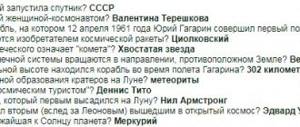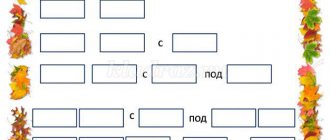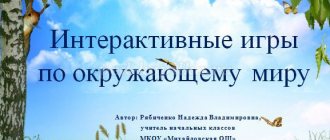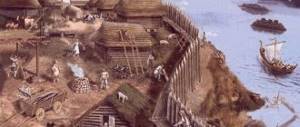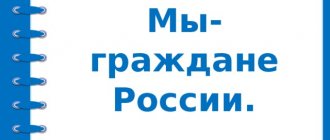Competitive game in Russian for 3rd grade “Starry Hour”
- March 26, 2016
Goals of the game:
- Arouse interest in the Russian language.
- Form figurative and expressive speech.
- Expand students' horizons.
- Develop imaginative and logical thinking.
Equipment:
- School songs.
- Decoration of the hall (statements of the greats about the Russian language, phraseological units, games with words - information that was posted on stands at the school all week; exhibitions of wall newspapers of all classes).
- Printed assignments, pencils.
- Stars (tokens), a set of numbers for answers (from 1 to 8).
Progress of the extracurricular event “Starry Hour”
School songs are played before the event begins. Students of grade 3 A dance the dance “We are little children” (“Fidgets”).
Host: Hello, guys! Hello, dear guests! Today we have a meeting in honor of the Russian language. What is remarkable about any language and what kind of honor is it for it, that even among the people they say: “The tongue feeds bread and spoils business.” I'll tell you an ancient legend.
Many centuries ago, a rich man ordered his slave Aesop to prepare the best for him and his guests. Aesop prepared tongues. "Why?" - asked the owner. “What could be better in the world than language! With the help of language, we study science and gain knowledge; with the help of language, people can explain themselves to each other, solve various issues, ask, inspire deeds, express joy, affection, and declare their love. Therefore, you need to think that there is nothing better than language,” answered Aesop. The next time, the rich man ordered Aesop to buy the worst for dinner, and the slave again bought and prepared tongues. Everyone was surprised at this, and Aesop explained: “What in the world is worse than language? With the help of language, people upset and disappoint each other, lie, deceive, cheat, and quarrel. Language can make people enemies, it can cause war, bring grief and evil into our lives, betray and insult. Can there be anything worse than language?
Guys, is Aesop right?.. Right, of course. But it’s up to us how we use our tongue. The tongue that is in our mouth and the tongue, speech, which for us is a means of communication. And now we will determine who can work the language best and who speaks Russian better than others.
Among our third grade students, we have experts in the Russian language who have participated in Olympiads and who have achieved success in this subject. Let's welcome them!
Today the students are fighting...
Fans, don’t be timid! There will be competitions for you too!
According to the rules of our game, after every two competitions the participant with the fewest points is eliminated.
Competition 1. “Warm-up”
Questions for game participants:
1. What does our speech consist of? (From proposals). 2. What are the main members of the sentence called? (Subject and predicate). 3. What do words mean that answer the questions: who? What? (Items). 4. What do the words mean that answer the questions: what to do? what to do? (Actions of objects). 5. How is the word translated? (by syllables). 6. What does the softness of a consonant sound at the end of a word mean? (Soft sign). 7. How are the words in a sentence related to each other? (Within the meaning of). 8. What do words mean that answer the questions: which? which? (Signs of objects).
Competition 2. “Hatches and Lions.”
Insert the appropriate letters into the missing spaces. Questions for participants:
1. _ L Yu _ K _ 1. Without this they don’t play hockey (stick). 2. _ L YU K _ 2. This one is in Baba Yaga’s hand (stick). 3. _ L Yu _ K _ 3. This one is baked like pies (bun) are baked. 4. _ L YU K _ 4. This one doesn’t know what a smile (an angry one) means. 5. _ L Yu _ _ _ K _ 5. Milk is poured into the cat (saucer). 6. _ L YU K _ _ 6. This one is brought from the swamp in a basket (cranberry). 7. _ L Yu _ _ K 7. This one was looking for Karabas-Barabas (key). 8. _ _ L E V _ _ _ _ 4. Leo is the source of news (TV).
The jury counts the points.
Competition for fans “Riddles”
1. I have been living in this world for a long time, I give names to objects. (Noun).
2. Black birds On every page They are silent, they come to life, Who can guess them. (Letters).
3. Letters-icons, like soldiers on a parade, are lined up in a strict order. Everyone stands in an appointed place, And the formation is called:... (alphabet).
4. What do objects mean to me? Only names. And when I come, everything will come into action. (Verb).
5. They sow with a feather, they reap with their eyes, they eat with their heads, they digest with their memory. (Certificate).
6. I give signs to objects, They are very noticeable to me. I decorate your speech, you need to know me, take care of me. (Adjective).
Competition 4. “Proverbs and sayings”
A fan reads a poem.
It’s not for nothing that proverbs say: It’s impossible to live without them! They are great helpers and true friends in life. Sometimes they instruct us, give us wise advice, sometimes they teach us something and protect us from harm. The proverb will never break, After all, even grief is not a problem with it. And our speech is emblematic of the proverb: Let's remember them, friends!
Assignment: find its continuation for each proverb.
Competition for players
Find errors in proverbs and sayings.
1. You can’t hide an awl in a pot (in a bag). 2. The family is not without running water (freak). 3. Don’t have a hundred rubles, but have a million (one hundred friends). 4. A smart person will not go up the mountain, a smart person will undermine (bypass it). 5. To be afraid of wolves - lie under a blanket (do not go into the forest). 6. You can’t spoil porridge with diesel fuel (oil). 7. Hard in training, easy on vacation (in battle).8. The mouse has big eyes (fear).
Questions for fans:
1. Seek without difficulty, but if you find it, take care. 2. Live forever and dig mountains. 3. Doesn’t spoil the furrows on the catcher. 4. If you don’t have a friend, you can’t pull the fish out of the pond. 5. The ant is small, the beast runs. 6. Old horse learn.
Competition 5. “Diplomas”
Poems are read by 1st grade children.
1 student.
The letter A and the letter O have been offended for a long time: - We, who are not guilty of anything, are often confused by the guys. Most of all, Petrusha Lyamin mocks us: He disfigures the word, Writes through a - “k a row”. The letter a is ashamed to stand here.
2 student.
Suddenly, from Lyamin Peter’s pen, Some kind of “trave” will crawl out from under him , Then some kind of “drugs ” , After all, even the grass will wither, If they say such a thing in front of her!
3 student.
The letter A and the letter O have been offended for a long time: - We gallop without any rules, Just as Petrusha made us, As if we were his enemies, At least run from the alphabet. (L. Druzhinina)
Now let’s check if there are any such Petrush Lyamins among you.
The task for the players is to correct Cousin's errors:
“Is it possible without a smile, it’s very painful and offensive, To see Cousin’s mistakes: the voice under your arm is unseen.” “Pour on the snow quickly, help Kuze, and hurt yourself, correct all mistakes.
(Jury scoring)
Competition for fans
Host: And the fans and I will rest at this time. Our tongues will work. Who will pronounce the tongue twister faster than others and correctly?
PATTER
At Varya's on the Boulevard, the mittens have disappeared. Varya returned from the boulevard in the evening, and found Varvara’s Mittens in her pocket. (Elena Blaginina)
Competition 6. “Catchphrases”
Presenter: Russian speech is rich in popular expressions, or, scientifically, phraseological units. You've probably heard many of them:
1. Know it like the back of your hand. 2. Sit with your hands folded. 3. Boil in your own juice. 4. Strike like a bolt from the blue. And etc.
The tasks for the participants are to briefly explain the meaning of phraseological units.
Questions for players:
1. Out of the blue (unexpectedly). 2. There is no room for the apple to fall (it’s cramped). 3. At least poke out your eyes (it’s dark). 4. Keep your mouth shut (be silent). 5. With a gulkin nose (little). 6. How I looked into the water (knew).
The jury sums up. 3 participants left.
Competition 8. Charade
Make as many words as possible from the scattered cubes. Based on the results of this competition, 1 participant is eliminated. And the participant who composed the most words is entitled to a prize in the box. Likewise, among the fans, the one who composed the longest word is chosen. The winner receives a prize from their chosen box.
Super game
2 players reach the final. Make up as many words as possible from the word PATRIOTISM. If participants run out of words, their pair can help them.
Summarizing
Host: Our competition is over. Let's ask the jury to sum it up. In the meantime, the rewards are on the way, I have a little surprise for you. Listen to how sometimes we speak, distorting our language. Laugh, but draw your own conclusions.
Watching a video from the film magazine “Yeralash”.
Rewarding.
Host: Remember, guys: “A bird is visible by its feathers, but a man is visible by his speech.” Goodbye! See you again!
Author: Nadezhda Viktorovna Serkova, primary school teacher of the first qualification category, MBOU "Kardymovskaya secondary school named after Hero of the Soviet Union S.N. Reshetov", Smolensk region, Kardymovo village.
Intellectual games in the activities of primary school students
MIND GAMES
IN THE ACTIVITIES OF PRIMARY SCHOOL STUDENTS
,
primary school teacher
Municipal educational institution "Kuedino Secondary School No. 1 - Basic School"
“I highly recommend that a person practice games that promote improvement, not for the sake of playing, but because they serve to improve the art of thinking and invention.”
Leibniz.
The further development of Russian science significantly depends on the influx of talented researchers, which is why it is so important to support children’s interest in knowledge already in elementary school by identifying especially gifted students. After all, it is during this period that inclinations, abilities, and talents manifest themselves and actively develop.
One of the most effective forms of classroom and extracurricular activities that help increase schoolchildren’s interest in knowledge are intellectual games. Recently, intellectual games have occupied an increasingly important place in the comprehensive development of younger schoolchildren. What are mind games? From the explanatory dictionary it follows that intelligence is the mind, the thinking ability, the mental principle of a person. The Philosophical Dictionary defines play as “an unproductive activity that is not carried out for practical purposes, but serves for entertainment and amusement, bringing joy in itself.” Further, the dictionary indicates that the game has educational and developmental significance and acts as a means of psychological preparation for real life situations. Consequently, intellectual games are an entertaining activity, as a result of which children’s thinking abilities are developed and spiritual and moral qualities are nurtured.
A person’s intelligence is primarily determined not by the amount of knowledge they have accumulated, but by a high level of logical thinking. Therefore, it is necessary to teach children to analyze, compare and summarize the information received, as well as to use the knowledge gained from their own observations and experience. Intellectual games provide an excellent opportunity for this and contribute to the development of creative activity of students, activate mental activity, form intellectual skills, develop all types of memory, attention, imagination, speech, and expand vocabulary.
Intellectual games allow children to develop not only individual learning activities, but also teamwork skills.
To develop intellectual skills, like any other skills, the following conditions must be met:
Focused and systematic.
Work on the development of intellectual skills should take place constantly both in class and in extracurricular activities.
The teacher must use the material from lessons in reading, the Russian language, mathematics, and the surrounding world in order to form logical and creative thinking. Motivation.
It is necessary to help students see the meaning of their intellectual activity, to see in this an opportunity to realize their own talents and capabilities, a way of self-development and self-improvement.
The element of competition plays an important role in motivating a child. Psychological comfort.
One of the teacher’s tasks is to encourage creative manifestations of students and the pursuit of knowledge.
It is important that they are not afraid to make a mistake and refrain from negative assessments. Each student must be given the opportunity to realize their strengths and believe in themselves. Taking into account age characteristics.
The development of intellectual abilities should be carried out at a level accessible to children's perception, it should be interesting and useful.
Following these conditions, a program was developed and is being implemented aimed at developing the intellectual abilities of primary schoolchildren through play. The classes provided for in this program are held extracurricularly at the association of additional education “Young Experts”.
The main goal of this association is
to create conditions for the development of children's cognitive interest and creative abilities by including them in various types of intellectual activities.
For myself, as a teacher, I have identified the following tasks:
Form logical and creative thinking and speech of students.
Increase the level of attention and memory of children.
Develop vital competencies (communication, information, self-education).
By implementing this program, I believe that I can achieve the following results:
Increase the level of development of students' intellectual and creative abilities. Develop the ability to independently work with additional sources of information. Teach children to work in a team.
Develop student interest
to various sciences, school disciplines and cognitive processes in general.
Methodology for conducting games.
Classes can be divided into several types: quizzes, “What? Where? When?”, “ABC”, “Pentagon”, “Own game” and others.
When conducting quizzes, I use different forms of work: frontal, group or individual. I conduct quizzes in a playful way, for example “The Smartest”, “Why Chicks”, “Magic Box”, etc. I also use techniques: erudite lotto, ten questions and others. The quiz often contains humorous questions and questions of ingenuity, puzzles, anagrams, and crosswords. From entertaining questions and riddles, which children often find on their own in various educational books and magazines, I am gradually moving on to literary quizzes.
Games such as “What? Where? When?”, “Own Game”, “Pentagon” are held according to certain rules. For example, the game “What? Where? When?" As a rule, it is held in two rounds. One minute is given to discuss each question. Written answers are submitted to the jury. The main scoring indicator of a team is the sum of correct answers in all rounds.
Intellectual games take place in the form of competition between teams.
Therefore, players conventionally perform certain roles, but the main burden falls on the captain.
The captain controls the situation for the first 5 seconds, if the guys are silent, he starts giving theories. He leads the discussion, tracks all the versions expressed by the players, appoints an answerer, and he must know that he will answer. If the team does not find an answer, the captain answers himself. The captain monitors the time and 5-10 seconds before the end of time must get the team to agree on the answer. Further, the expected roles are distributed as follows: idea generator - expresses ideas on the issue, proves them; critic - refutes these ideas, proving that he is right; polymath - scientifically confirms ideas or complements versions; emotional stabilizer – raises “team spirit”, or calms at the right moment; implementer – prepares the formulation of the answer.
The most important thing in all this is to understand that roles are not strictly regulated, but vary depending on the person, his experience and abilities.
As a result of playing games, the level of development of students’ intellectual and creative abilities increases. Children determine the functions of the participants and methods of interaction, independently identify the problem and ways to solve it, and learn to express their thoughts in accordance with the tasks.
Contents of games.
Intellectual games can be divided into thematic and general. Thematic games are based on one specific topic. Generalized games examine questions from different areas of knowledge. For example, thematic quizzes “The Nutcracker”, “Dunno”, “Boy Wizard” (based on the fairy tale novel “Harry Potter and the Philosopher’s Stone” by J.K. Rolling). Children prepare for such quizzes on their own, and then the game is played.
In games I use various types of questions, for example these:
1.
“A question containing an answer.” These are questions that contain the answer in its entirety or in essence (same root word, distorted form of the word).
For example: “This is Just a Miracle! In 2004, for the first time in history, a greyhound won a race against a racing horse. Name the dog’s name, which in Russian translation consists of two words.” Answer: Just a Miracle. 2.
“A question on an eternal topic.” There are a number of topics, which include: the sun of Russian poetry, Olympiads, leap years, the alphabet, Roman and Arabic numerals, Morse code, sheet music, money, cards, chess, muses, months and days of the week, cardinal points, etc. Often quite simple remember this list, and the answer is ready.
For example: “I, F, M, A, M, I, I, A, S, O, N, complete the row.” Answer D – December. 3.
"Selection". This is the most common type of question.
Based on the information contained in the question, from the possible number of answers (quite often small), you should choose not one hundred percent that follows, but the most probable one - what actually happened. Little-known facts are presented, discarding false versions, well-known ones - you have to remember for yourself. For example: “The world’s first European Championship in the 75 cm race was held on a beach near Barcelona. The winner covered this distance in 1 minute 20 seconds, as if refuting the opinion about his relatives. Who competed?" Answer: Turtles. Get full text
4.
"Mosaic". Several facts about an object, phenomenon, or person are given, often very different, and it is required to determine how or what it is.
For example: “This bird of prey lives in the mountains and steppes, and its image can also be seen on the coat of arms of our country.” Answer: eagle. 5.
"Etymology". This is a question about the origin of a word or figurative expression.
This also includes defining a word by its early form or an expression by its part. For example: “In the old days, the nose was the name for sticks that people carried with them in order to make notes on them about what they needed to remember and not forget. What catchphrase appeared as a result of this”? Answer: Hack on the nose. 6.
"Allegory". Something familiar to everyone is described, but from an unusual angle, so that it is difficult to guess what it is about.
But it is possible. In general, the unknown is about the known, which must be determined. For example: “You undoubtedly love action-packed works. Here is the plot of one of them: while walking, a treasure was unexpectedly found. On the occasion of the discovery, a celebration will be held, which is overshadowed by the appearance of an insidious villain. The heroine's life is in danger, but at the last moment the hero appears and kills the villain. It all ends with a wedding. What is the name of the heroine of the work? Answer: Cluttering fly. 7. "Nonsense"
In these questions, it is proposed to name objects or subjects that have given properties - but in fact they do not exist at all, which is what needs to be justified.
For example: “Once you are in the center of Moscow, do not forget to visit Kuznetsky Most Street. It has long been famous for its shops. There is only one thing missing on this street, but all visitors look around in surprise and look for it. What are they looking for? Answer: Bridge. When answering a question, children select the necessary information, structure it, identify general laws, analyze, compare, reason and find a solution.
Thus, organizational and pedagogical conditions, implemented in extracurricular activities, make it possible to solve the problems of developing the intellectual abilities of schoolchildren and master new ways of acquiring knowledge.
The “Young Experts” club program has been implemented at our school for the fourth year. Children attend all classes with enthusiasm. In each grade from the second to the fourth, close-knit and friendly teams appeared that compete with each other. School teams participate in regional, zonal and all-Russian competitions.
